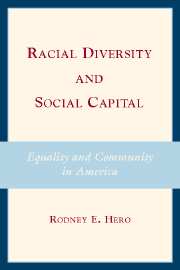Book contents
- Frontmatter
- Contents
- List of Tables and Figures
- Preface
- Acknowledgments
- 1 Introduction
- 2 The Social Capital Thesis
- 3 The Racial Diversity Thesis
- 4 Examining Social Outcomes, and Civic and Economic Equality
- 5 Voter Turnout and Other Forms of Participation in Context (with Caroline Tolbert)
- 6 Public Policy Outputs
- 7 Conclusion
- References
- Index
7 - Conclusion
Published online by Cambridge University Press: 18 December 2009
- Frontmatter
- Contents
- List of Tables and Figures
- Preface
- Acknowledgments
- 1 Introduction
- 2 The Social Capital Thesis
- 3 The Racial Diversity Thesis
- 4 Examining Social Outcomes, and Civic and Economic Equality
- 5 Voter Turnout and Other Forms of Participation in Context (with Caroline Tolbert)
- 6 Public Policy Outputs
- 7 Conclusion
- References
- Index
Summary
I began this book by posing a battery of questions about the relationship of race and community – of racial diversity and social capital – in American politics, positing that the two are likely intertwined and/or in tension in extensive and complex ways. In broad terms the question was whether racial considerations, and racial minority populations, have substantially affected the sense of community in America. Furthermore, I set out to systematically assess these two interpretations, each traceable to philosophical traditions in American politics, in relationship to one another as evidenced in state politics particularly. The social capital thesis has argued that civic association and sense of community have been a dominant influence in American politics, with a variety of powerful beneficial effects (while acknowledging that social capital may occasionally have a “dark side”). Social capital studies have provided a theoretical basis and extensive empirical evidence on behalf of its claims (see especially Putnam 2000 and Chapter 3 herein). The contemporary racial diversity thesis focuses on firmly acknowledging and systematically incorporating elements of the anti-egalitarianism tradition into scholarly inquiries, thereby seeking to understand the historical and recent implications of that legacy.
Exploration of these two interpretations quickly led me to confront an important puzzle in American politics research that structured the later empirical analyses. Higher racial diversity is associated with lesser and less equitable political processes and public policy outcomes (even after accounting for a variety of other factors; Hero 1998), yet higher levels of social capital are associated with “better” processes and outcomes (Putnam 2000).
- Type
- Chapter
- Information
- Racial Diversity and Social CapitalEquality and Community in America, pp. 151 - 184Publisher: Cambridge University PressPrint publication year: 2007

